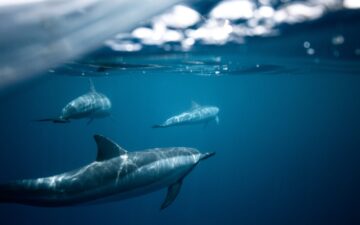Breaking Down Climate Geoengineering Part 4
Part 1: Endless Unknowns
Part 2: Ocean Carbon Dioxide Removal
Part 3: Solar Radiation Modification
The technical and ethical uncertainties around climate geoengineering are numerous in both carbon dioxide removal and solar radiation modification projects. While climate geoengineering has seen a recent push toward enhanced natural and mechanical and chemical projects, a lack of research into the ethical implications of these projects are cause for concern. Natural ocean climate geoengineering projects are facing similar scrutiny, increasing the need for a conscious effort to prioritize equity, ethics and justice in climate change mitigation. Through the Blue Resilience Initiative and EquiSea, TOF has worked toward this goal by developing nature-based solutions to enhance climate resilience, building capacity for ocean science and research, and matching the needs of local coastal communities.
Conservation and restoration of blue carbon: The Blue Resilience Initiative
TOF’s Blue Resilience Initiative (BRI) has developed and implemented natural climate change mitigation projects to aid coastal communities. BRI’s projects specialize in restoring and enhancing the productivity of coastal ecosystems, in turn, supporting atmospheric and oceanic carbon dioxide removal. The initiative specializes in the development of seagrasses, mangroves, salt marshes, seaweed, and corals. These healthy coastal blue carbon ecosystems are estimated to store up to 10 times the amount of carbon per hectare relative to terrestrial forest ecosystems. The CDR potential of these nature based solutions are high, but any disturbance or degradation of these systems can release large amounts of stored carbon back to the atmosphere.
Beyond the restoration and cultivation of nature based carbon dioxide removal projects, BRI and TOF are focused on capacity sharing and promoting justice and equity in the development of a sustainable blue economy. From policy engagement to technology transfer and training, BRI works to uplift the natural coastal ecosystems and the communities who depend on them. This combination of collaboration and engagement is crucial to ensure the voices of all stakeholders are heard and incorporated into any plan of action, especially plans like climate geoengineering projects that aim for a planet-wide impact. The current climate geoengineering conversation has lacked attention on the ethics and potential consequences of enhanced natural and chemical and mechanical climate geoengineering projects.
EquiSea: Toward the equitable distribution of ocean research
TOF’s commitment to ocean equity extends beyond the Blue Resilience Initiative and has been developed into EquiSea, a TOF initiative dedicated to the equitable distribution of ocean science capacity. Science backed and scientist driven, EquiSea aims to fund projects and coordinate capacity building activities for the ocean. As research and technology expands in the climate geoengineering space, ensuring equitable access needs to be a top priority for political and industry leaders, investors, NGOs, and academia.
Ocean governance and moving toward a code of conduct for climate geoengineering that considers the ocean
TOF has been working on oceans and climate change issues since 1990. TOF regularly submits public comments at the national, subnational, and international level urging consideration of the ocean, and of equity, in all conversations on climate geoengineering as well as calling for a geoengineering code of conduct. TOF advises the National Academies of Sciences, Engineering, and Medicine (NASEM) on geoengineering policy, and is the exclusive ocean advisor to two ocean-centric investment funds with a combined $720m in assets under management. TOF is part of a cutting edge collaboration of ocean conservation organizations seeking common ground and effective avenues to communicate the need for precaution, and regard for the ocean, when considering climate geoengineering options.
As research for climate geoengineering moves forward, TOF supports and encourages the development of a scientific and ethical code of conduct for all climate geoengineering projects, with a specific and distinct focus on the ocean. TOF has worked with the Aspen Institute toward rigorous and robust guidance on ocean CDR projects, encouraging the development of a code of conduct for climate geoengineering projects, and will act to peer review an Aspen Institute draft code later this year. This code of conduct should encourage research and development of projects in conversation with potentially affected stakeholders, offering education and support for the various impacts of such projects. Free, prior, and informed consent in addition to the right of refusal for stakeholders will ensure that any climate geoengineering projects operate with transparency and strive toward equity. A code of conduct is necessary for the best results from conversations around climate geoengineering to the development of projects.
Diving into the ocean climate geoengineering unknown
Conversations around ocean climate geoengineering, technology, and governance are still relatively new, with governments, activists, and stakeholders around the globe working to understand the nuances. While new technology, carbon dioxide removal methods, and sunlight radiation management projects are under scrutiny, the ecosystem services that the ocean and its habitats provide for the planet and people are not to be underestimated or forgotten. TOF and BRI are working to restore coastal ecosystems and support local communities, prioritizing equity, stakeholder engagement, and environmental justice every step of the way. The EquiSea project furthers this commitment to justice and highlights the desire of the global scientific community to increase accessibility and transparency for the betterment of the planet. Climate geoengineering regulation and governance needs to incorporate these main tenants into a code of conduct for any and all projects.
Key Terms
Natural Climate Geoengineering: Natural projects (nature-based solutions or NbS) rely on ecosystem-based processes and functions that occur with limited or no human intervention. Such intervention is usually limited to afforestation, restoration or conservation of ecosystems.
Enhanced Natural Climate Geoengineering: Enhanced natural projects rely on ecosystem-based processes and functions, but are bolstered by designed and regular human intervention to increase the ability of the natural system to draw down carbon dioxide or modify sunlight, like pumping nutrients into the sea to force algal blooms that will take up carbon.
Mechanical and Chemical Climate Geoengineering: Mechanical and chemical geoengineered projects rely on human intervention and technology. These projects use physical or chemical processes to effect the desired change.







